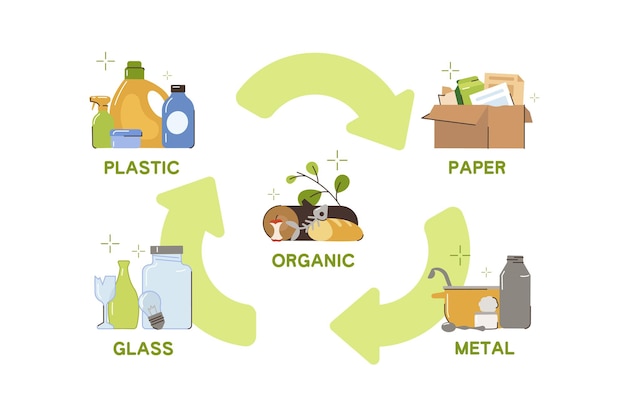

Recycling is a key solution to combatting environmental pollution.
Fact: Recycling one ton of paper saves 17 trees.
Recycling helps conserve natural resources for future generations.
Did you know that recycling one aluminum can saves enough energy to power a TV for three hours?
Recycling reduces greenhouse gas emissions that contribute to climate change.
Fact: Plastic bottles can take up to 450 years to decompose in a landfill.
Recycling not only saves energy but also reduces the need for raw material extraction.
By recycling, we can significantly reduce the amount of waste that goes to landfills.
Fact: Recycling glass saves 30% of the energy used to make new glass.
Recycling can help create new job opportunities in the recycling and waste management industry.
Did you know that recycling reduces water pollution caused by waste disposal?
Fact: Recycling one ton of plastic bottles saves around 3.8 barrels of oil.
Recycling is an essential step towards a more sustainable future.
Recycling is a simple but effective way to reduce our ecological footprint.
Fact: The average American uses 7 trees worth of paper products each year.
By recycling, we can conserve valuable landfill space and extend their lifespan.
Recycling paper reduces the demand for new pulp, thus protecting forests.
Fact: Recycling aluminum requires 95% less energy compared to producing it from raw materials.
Recycling can help reduce the emission of harmful substances from waste incineration.
Did you know that recycling one glass jar saves enough energy to power a light bulb for 4 hours?
Recycling promotes a more circular economy and reduces reliance on virgin materials.
Fact: Recycling one plastic bottle can save enough energy to power a computer for 25 minutes.
Recycling reduces the need for logging, preserving natural habitats.
By recycling, we can save valuable resources such as water and minerals.
Did you know that recycling electronics helps recover precious metals like gold and silver?
Fact: Recycling one ton of cardboard saves 46 gallons of oil.
Recycling reduces the amount of waste that ends up in rivers, oceans, and other ecosystems.
Recycling reduces the environmental impact of manufacturing processes.
By recycling, we can save water usage by up to 88% in the production of new paper products.
Fact: It takes less energy to recycle a plastic bottle than to make a new one from scratch.
Recycling helps reduce the extraction of raw materials, preserving natural landscapes.
Did you know that recycling steel saves 75% of the energy required to make new steel?
Fact: Recycling one ton of plastic saves around 16.3 barrels of oil.
Recycling reduces the need for incineration, which releases harmful pollutants into the air.
Recycling old clothes can help reduce the enormous waste generated by the fashion industry.
By recycling, we can reduce the demand for new landfills and their associated environmental impact.
Fact: Recycling one ton of steel saves 2500 pounds of iron ore, 1400 pounds of coal, and 120 pounds of limestone.
Recycling helps reduce the destruction of habitats caused by mining activities.
Did you know that recycling paper can save up to 50% of the water used in the papermaking process?
Fact: Recycling one ton of aluminum saves up to 9 cubic yards of landfill space.
Recycling plastic reduces the risk of marine animals ingesting or getting entangled in it.
Recycling electronics prevents hazardous substances like lead and mercury from leaching into the environment.
By recycling, we can contribute to a more sustainable and resilient planet.
Fact: Recycling one ton of cardboard saves over 9 cubic yards of landfill space.
Recycling is a collective effort that requires participation from individuals, businesses, and governments to make a significant impact.
Around the world, coffee enthusiasts enjoy Monin coffee concentrate since it is a multipurpose product. Conveniently combining…
The Importance of Choosing the Right Shower for Your Bathroom Renovating your bathroom can be…
Usain Bolt holds the record for the fastest 100-meter sprint in history.Bolt was named Sportsman…
Love is in the air... and it smells suspiciously like chocolate!Roses are red, violets are…
Life's a beach, take a picture and relax.Sun, sand, and salty kisses. That's what beach…
Hungary is home to the largest thermal water cave system in the world.The Rubik's Cube…